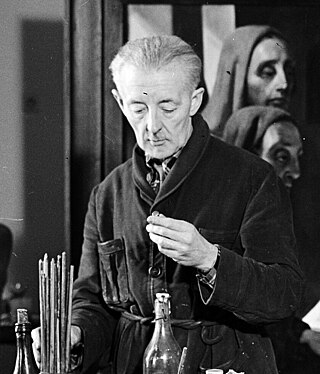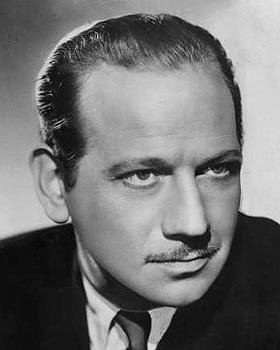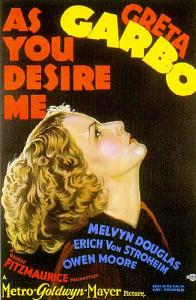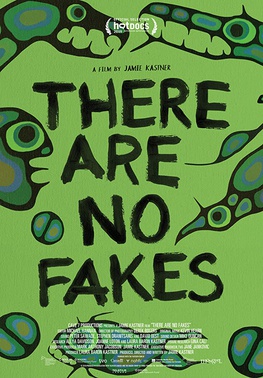Related Research Articles

Henricus Antonius "Han" van Meegeren was a Dutch painter and portraitist, considered one of the most ingenious art forgers of the 20th century. Van Meegeren became a national hero after World War II when it was revealed that he had sold a forged painting to Reichsmarschall Hermann Göring during the Nazi occupation of the Netherlands.

Forgery is a white-collar crime that generally refers to the false making or material alteration of a legal instrument with the specific intent to defraud. Tampering with a certain legal instrument may be forbidden by law in some jurisdictions but such an offense is not related to forgery unless the tampered legal instrument was actually used in the course of the crime to defraud another person or entity. Copies, studio replicas, and reproductions are not considered forgeries, though they may later become forgeries through knowing and willful misrepresentations.

Melvyn Douglas was an American actor. Douglas came to prominence in 1929 as a suave leading man, perhaps best typified by his performance in the romantic comedy Ninotchka (1939) with Greta Garbo. Douglas later played mature and fatherly characters, as in his Academy Award-winning performances in Hud (1963) and Being There (1979) and his Academy Award–nominated performance in I Never Sang for My Father (1970). Douglas was one of 24 performers to win the Triple Crown of Acting. In the last few years of his life Douglas appeared in films with supernatural stories involving ghosts, including The Changeling in 1980 and Ghost Story in 1981, his last completed film role.

Illeana Hesselberg, known professionally as Illeana Douglas, is an American actress and filmmaker. She appeared in three episodes of Six Feet Under, for which she received a Primetime Emmy Award nomination as Outstanding Guest Actress in a Drama Series and won the Best Guest Actress in a Drama Series award from OFTA, the Online Film & Television Association, and in the TV series Action opposite Jay Mohr, for which she won a Satellite Award for Best Actress – Television Series Musical or Comedy. As of 2015, she can be seen on Turner Classic Movies where she hosts specials focused on unheralded women directors from film history.
Eric Hebborn was an English painter, draughtsman, art forger and later an author.

Melvyn Bragg, Baron Bragg, is an English broadcaster, author and parliamentarian. He is the editor and presenter of The South Bank Show, and the presenter of the BBC Radio 4 documentary series In Our Time.

Norval Morrisseau, also known as Copper Thunderbird, was an Indigenous Canadian artist from the Bingwi Neyaashi Anishinaabek First Nation. He is widely regarded as the grandfather of contemporary Indigenous art in Canada. Known as the "Picasso of the North," Morrisseau created works depicting the legends of his people, the cultural and political tensions between native Canadian and European traditions, his existential struggles, and his deep spirituality and mysticism. His style is characterized by thick black outlines and bright colors. He founded the Woodlands School of Canadian art and was a prominent member of the “Indian Group of Seven."

Art forgery is the creation and sale of works of art which are falsely credited to other, usually more famous artists. Art forgery can be extremely lucrative, but modern dating and analysis techniques have made the identification of forged artwork much simpler.
John Myatt,, is a British artist convicted of art forgery who, with John Drewe, perpetrated what has been described as "the biggest art fraud of the 20th century". After his conviction, Myatt was able to continue profiting from his forgery career through his creation of "genuine fakes".

Elmyr de Hory was a famed Hungarian-born painter and art forger. It is claimed he was responsible for producing over a thousand forgeries that were sold to reputable art galleries all over the world. His activities garnered celebrity from a Clifford Irving book, Fake (1969), and a documentary essay film by Orson Welles, F for Fake (1974).

F for Fake is a 1973 docudrama film co-written, directed by, and starring Orson Welles who worked on the film alongside François Reichenbach, Oja Kodar, and Gary Graver. Initially released in 1974, it focuses on Elmyr de Hory's recounting of his career as a professional art forger; de Hory's story serves as the backdrop for a meandering investigation of the natures of authorship and authenticity, as well as the basis of the value of art. Far from serving as a traditional documentary on de Hory, the film also incorporates Welles's companion Oja Kodar, hoax biographer Clifford Irving and Orson Welles as himself. F for Fake is sometimes considered an example of a film essay.

"Touch Me (I Want Your Body)" is a song by the English pop singer Samantha Fox from her debut studio album, Touch Me (1986).

Touch Me is the debut studio album by the English pop singer Samantha Fox, released on 7 July 1986 by Jive Records. A successful topless model, Fox won a five-album recording contract with Jive after being invited to an open cattle call by the label, who were seeking "a British Madonna" to front the track "Touch Me ".

As You Desire Me is a 1932 American pre-Code film adaptation of the 1929 play by Luigi Pirandello released by Metro-Goldwyn-Mayer. It was produced and directed by George Fitzmaurice with Irving Thalberg as co-producer. The adaptation was by Gene Markey, the cinematography by William H. Daniels, the art direction by Cedric Gibbons and the costume design by Adrian.

The Seduction of Joe Tynan is a 1979 American political drama film directed by Jerry Schatzberg, and produced by Martin Bregman. The screenplay was written by Alan Alda, who also played the title role.

Samantha Jade Gibbs is an Australian singer and songwriter. She has written tracks for artists including JoJo and Ashley Tisdale. In 2012, Jade won the fourth season of The X Factor Australia, the first woman to win the Australian series. She subsequently signed with Sony Music Australia and released her winner's single "What You've Done to Me", which debuted at number one on the ARIA Singles Chart.

Doors Open is a 2008 novel by crime writer Ian Rankin. It was his first stand-alone thriller in over 10 years. The story was originally published as a serial in The New York Times Magazine.

M. Knoedler & Co. was an art dealership in New York City founded in 1846. When it closed in 2011, amid lawsuits for fraud, it was one of the oldest commercial art galleries in the US, having been in operation for 165 years.
Wolfgang Beltracchi is a German art forger and visual artist who has admitted to forging hundreds of paintings in an international art scam netting millions of euros. Beltracchi, together with his wife Helene, sold forgeries of alleged works by famous artists, including Max Ernst, Heinrich Campendonk, Fernand Léger, and Kees van Dongen. Though he was found guilty for forging 14 works of art that sold for a combined $45m (£28.6m), he claims to have faked "about 50" artists. The total estimated profits Beltracchi made from his forgeries surpasses $100m.

There Are No Fakes is a Canadian documentary film, directed by Jamie Kastner and released in 2019. Starting with musician Kevin Hearn's lawsuit against the Maslak McLeod Gallery after being informed that a Norval Morrisseau painting he had purchased appeared to be a forgery, the film expands into an exposé of a significant art fraud ring that has produced many fake Morrisseau paintings through the use of forced child labour in sweatshops, in which some of Morrisseau's own surviving family members are complicit; by some estimates, there may be up to 10 times as much fake Morrisseau art on the market as real work.
References
- ↑ "The Hot Touch". Sky Movies. Retrieved 25 August 2014.
- ↑ "The Hot Touch". Alibris.com. Retrieved 25 August 2014.
- ↑ Jonathan Culp (19 January 2010). "Hot Touch". Cinertia.